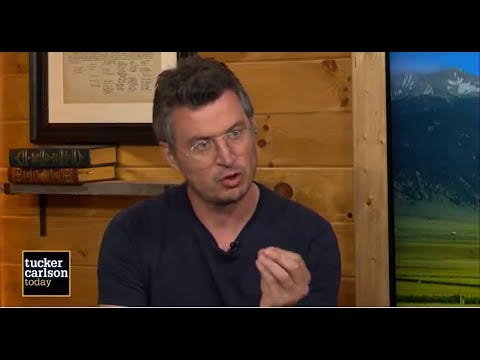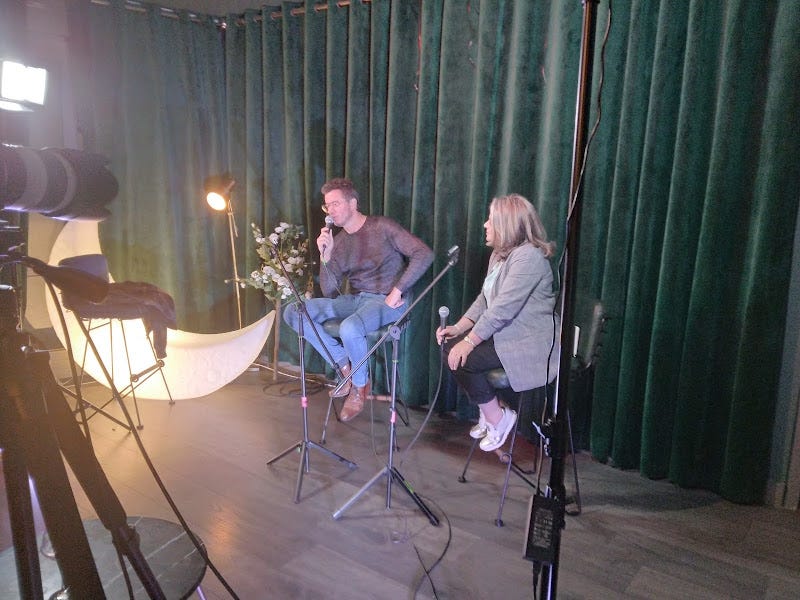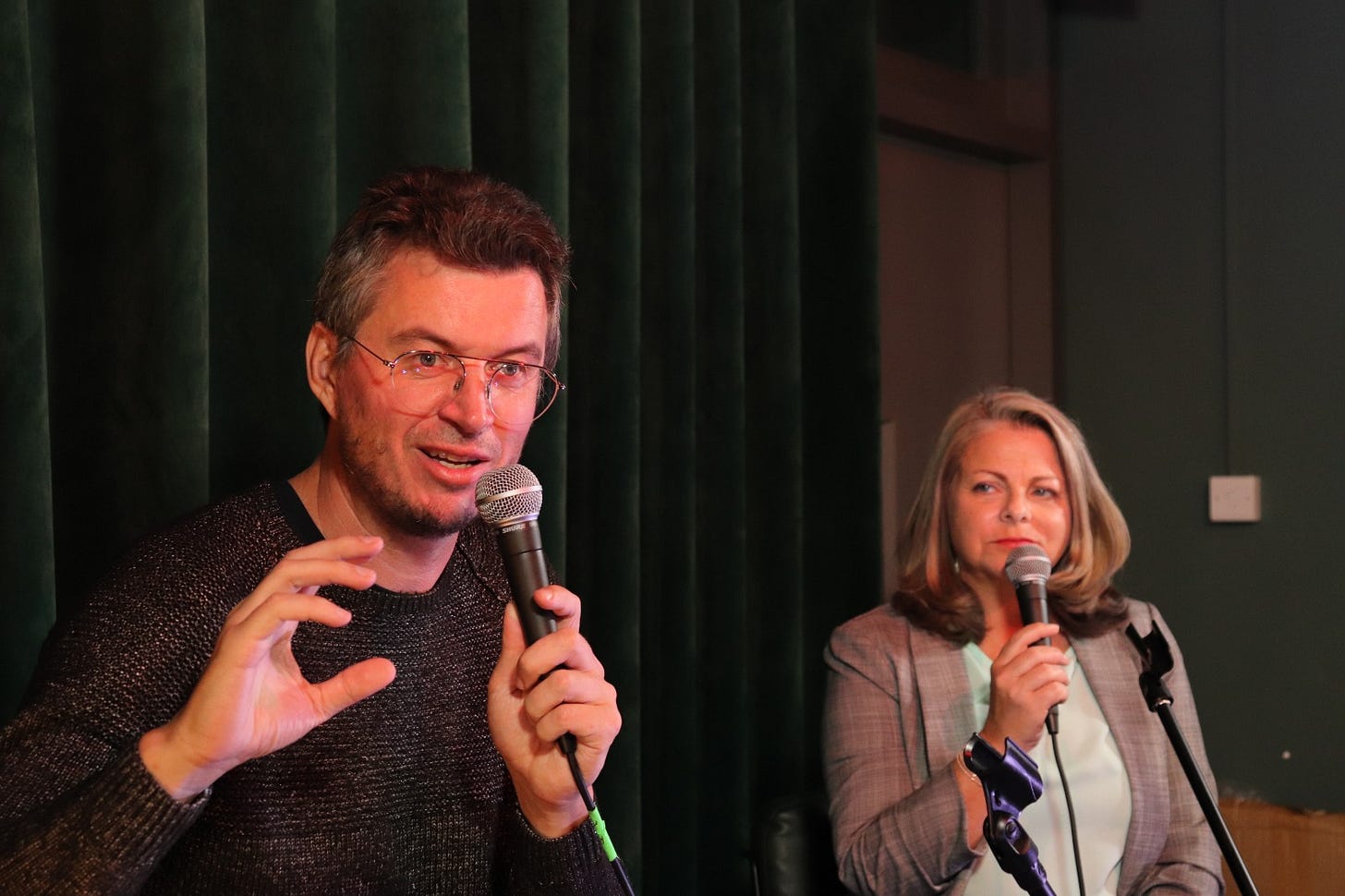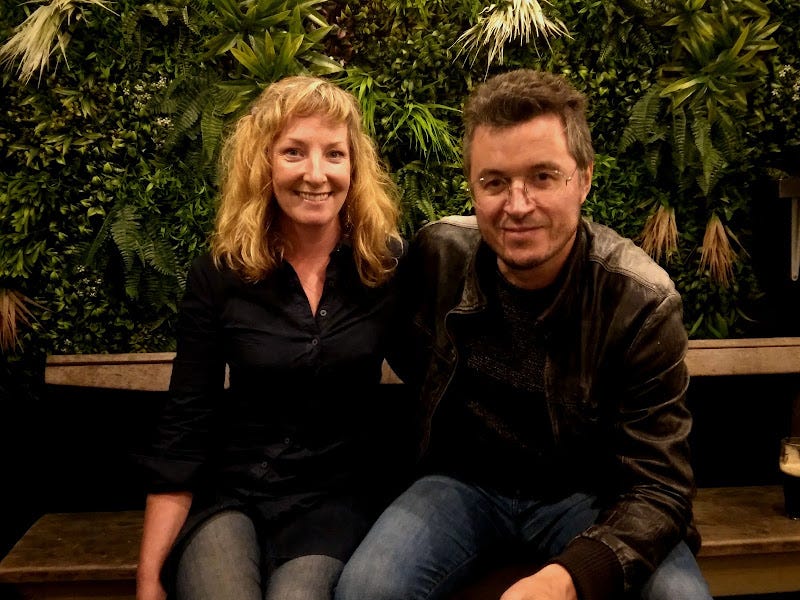Professor Mattias Desmet is a Belgian academic who writes on the theory of mass formation as it applies to the Covid 19 phenomenon. He is a Professor of Clinical Psychology at Ghent University in Belgium. His book, The Psychology of Totalitarianism, deals with the dangers of group think and his belief that society is being unconsciously lead towards a state of totalitarianism, where non-conforming thought is dismissed as ‘dissident.’
He is currently enduring a bruising campaign on behalf of the Belgian press, following an appearance on Fox News’ Tucker Carlson Tonight show earlier this month.
The Professor predicts the coming of a ‘chaotic and difficult’ period, with resulting uncertainty used as a catalyst to convince people of the merits of a new method to manage society.
“But don’t exhaust yourself on predictions,” Prof Desmet told an audience gathered in an upstairs bar area at the Button Factory in Dublin, his quiet confidence competing with the sounds of the street outside.
The evening took the form of an interview with Sara Haboubi of Making Sense Events followed by audience questions, culminating in a conversation with journalist John Waters.
“Focus on humanity. Focus on ethical principles and try to stay true to them. Don’t be afraid of what you might lose,” Prof Desmet instructed his audience.
“Try to understand what it is like to be a human being in a dehumanised world. Try to understand that this is what life is about,” he said.
The mere existence of such an effort, according to the professor, will put pressure on the larger group organism, which he said cannot be allowed to advance unquestioned.
“We each have to be able to articulate our own position. To recognise the human in each other. Diversity is the beauty of humanity,” he said, repeating what is perhaps his most prescient message – the importance of speaking out ‘regardless of the consequences.’
This action may appear abstract and feel futile, but it is ultimately powerful in unexpected ways.
“The solution will come from the small group if we stick to our ethical principles. For example, look back to the Dreyfus Affair in France. They continued to speak out and they changed history,” he said.
The Dreyfus Affair was a scandal that rocked French society at the turn of the 19th century, when a Jewish captain in the French army was falsely convicted of passing military secrets to the Germans.
A French newspaper known for it’s anti-Semitic views, La Libre Parole (Free Speech) broke the story with the headline “High Treason: Arrest of the Jewish Officer, A. Dreyfus.” The information had been leaked from an anonymous source within the army, according to the paper.
The story, printed in 1896 purported that Alfred Dreyfus had made a ‘full confession’ with ‘absolute proof that he sold our military secrets to Germany.’
The saga tore France apart for 12 years, until mounting evidence that could not be ignored finally brought an end to the Dreyfus Affair in 1906, but not before Dreyfus had been put through a humiliating public shaming known as ‘degradation.’
Throughout the scandal, Dreyfus’ family, particularly his brother Mathieu, refused to stay silent.
Sitting down with Prof Desmet one-on-one, post presentation, he reveals some of what’s behind his motivation for ‘continuing to speak up.’
The second youngest of 13 children, he grew up in the small village of Wakken in the north west of Belgium. His family are supportive Desmet said, possibly even proud of his resolution to stay true to himself.
“It was a tradition in my family. At least several of the narratives that circulated and that were conveyed from generation to generation in my father’s family line, were about the courage to speak out. They were small examples but they always fascinated me as a child because my ancestors often spoke out even when it meant they would have to leave the village because the priests or others didn’t appreciate what they had to say,” he said.
“My father and my grandfather, they were people who in many respects, had a strong feeling for justice. They were not scared of going against the current, or the group. I also had this (mindset) as a child I think. If I ever had a feeling there was injustice, something happening that was not fair, I usually preferred to fight than to sit back and remain silent and watch what happened,” he said.
Back in 1991, an American author who studied at the Carl Jung Institute in Switzerland, Robert A. Johnson, published a book entitled Owning Your Own Shadow.
“To refuse the dark side of one’s nature is to store up or accumulate the darkness, this is later expressed as a black mood, psychosomatic illness or unconsciously inspired accidents. We are presently dealing with the accumulation of a whole society that has worshipped it’s light side and refused the dark and this residue appears as war, economic chaos, strikes, racial intolerance. The front page of any newspaper hurls the collective shadow at us,” he wrote.
Johnson chose an Irish writer to illustrate his point.
“George Bernard Shaw said the only alternative to torture is art. This means we will engage in our creativity (in the ceremonial or symbolic world) or have to face it’s alternative; brutality.”
The following is an explanation of Shadow that the reader might consider could be applied to the most ardent supporters of either side of the Covid 19 catastrophe.
“Although the shadow is an innate part of the human being, the vast majority of us are wilfully blind regarding its existence. We hide our negative qualities, not only from others but from ourselves. To do this we often criticize and condemn others to ensure our focus does not fall on our own faults and destructive tendencies. We go through life with a false air of moral superiority and a belief that while others act immorally and destructively, we ourselves are wholly virtuous and always in the right.”
(https://academyofideas.com/2015/12/carl-jung-and-the-shadow-the-hidden-power-of-our-dark-side/)
Is it possible to argue that the saturation of technology upon society has quashed the collective creative ability to the point that humanity may well be teetering on the edge of something disastrous?
Do we each have a personal responsibility to find and face our own Shadow, as Carl Jung considered we should?
“Yes I think so,” Prof Desmet answered.
“Throughout this crisis and this process of speaking out I’ve started to become more aware of my own shadow in a very direct, tangible way. Even throughout the last months, I’ve really started to become aware of the fact that in many respects my life as I constructed it throughout the last twenty years or so, my identity as a professor at a university, even at the level of my private life there are many things that I constructed that were not really me. I started to become aware that if I continued that way, I would never really live my own life.”
“I’m often talking about truth speech and so on. I’m becoming more aware of the fact that if you really want to speak in a sincere way, you have to make sure your life is in harmony with the words you speak,” he said.
“I went from crisis to crisis in my life. In one way or another I have a certain talent to end up in a crisis but every time, I notice, I am much stronger. I think we should have the courage to face our anxiety. To go through the wall of our anxiety because that’s what defines us, that’s what makes us exist as human beings. You can only become yourself on the other side of the wall of anxiety. Time and time again we have to challenge our anxiety, we have to go through it, investigate it. We should never draw back from our anxiety.”
What is the reward for doing that?
“Well, authentic existence. In our lives we try to live up to others’ expectations. We try to become someone, to be what the other wants us to be. Very slowly, we have to become who we are. We can only do that by going against the other, who wants us and expects us to do certain things. We have to go against the other who has a certain opinion of us, against the other who supports us, against the other that pays us and so on,” Desmet said.
“If we ever want to be close to the creative power that resonates inside ourselves then we have to have the courage to go against what other people want us to do and in this way, strangely enough, we will be able to give the other something that is really valuable, that is, ourselves.”
Lately, Desmet has been reading Mahatma Gandhi's autobiography.
“He was not a great intellectual. He was a simple human being. But he was constantly aware of the fact that it’s not enough to understand what truth is, you have to live up to what you think truth is.”
“I think the most important thing that he teaches us is that it’s not enough to be able to talk about truth. You have to live up to your truth. The more I become aware of that, the more I become enthusiastic about and fascinated by a life in which what you do is really in harmony with what you say.”
“So I think facing your shadow means becoming aware of the way in which you keep up appearances. Maybe your life is a fake life, and you should be trying to live in a more sincere, honest, open way. I will try do so,” he said.
“Let the ears of the guilty people tingle with truth,” is a phrase from the work of the late civil rights activist W.E.B Du Bois, whose book of essays The Souls of Black Folk is considered a seminal work in African–American literature.
Does Desmet think truth can manifest as a physical feeling, a type of truth tingle as Du Bois suggests?
“Truth is a resonating phenomenon, I really think so,” Desmet said.
“It is not a matter of logical understanding. It’s being touched by something. Suddenly having the feeling, okay yes that is true for me, that touches me, that grasps something of my lived experience as a human being. It makes life more simple. It reduces the complexity. It makes something vibrate in myself, it makes me feel that I exist as a human being beyond all the experiences I kept up in my life.”
Desmet moved through a period of atheism in his life. He takes his time in considering an answer to the meaning of the word ‘soul.’
“I think for me the human soul is something that emerges when we speak true words. I will define it referring to the act of speech again. That’s why we lose our self when we refrain from articulating the words that seem sincere and honest to us. We feed our soul if we have the courage to speak out in a sincere way. That’s what I notice time and time again, if you are in company and you reveal something of yourself, you have the courage to say something knowing that it will make you vulnerable or people could take advantage of it to hurt you but still you decide to reveal your own lack as a human being. That’s the moment you start to exist as a human being,” he said.
“My father had the habit of listening to people and then giving his opinion no matter what people thought, I also had this habit. From the beginning at university I went against the entire academic community if I needed to and they were angry with me, 90% of the people were angry with me. Just because in a quiet way I tried to show them what in my opinion, was wrong with academic research tradition. My first book was called the Pursuit of Objectivity in Psychology and it showed in my opinion how absurd most psychological research is and everybody was angry with me and still for me it was much more important to stick to reason, to stick to the fact that I believe this because I knew that was my psychological backbone, to stay true to my feeling of what is right and wrong.”
The anger of his peers manifested in attempts at ostracisation, which have become acute over the past two weeks following Desmet’s television appearance with Tucker Carlson.
“I think the mainstream media in Belgium were very nervous because they knew that I would go to Tucker Carlson and up until then they had tried to ignore me,” he said.
“My book was a huge bestseller in Belgium but they never mentioned me, not even one time. Then when I went to Tucker Carlson they had a feeling they cannot remain silent and they found this minor mistake and some other things in what I said and they have tried to smear me for ten days now.
“In every major newspaper, they all published four or five articles about me, even interviewing students anonymously who claim that my classes were near indoctrination. There were so many students that said the opposite and said it just was not true, who wanted to have their opinion published not anonymously - under their own name - but no one made it into the mainstream media. They could only give their opinion on social media. There were several colleagues also who wrote an opinion paper saying look, what’s going on is a shame, but their opinion was never published (in the mainstream newspapers) only on social media and on LinkedIn.
“So it has been going on now for two weeks and it’s still going on but I remain quiet and calm because I know. Let them do it because sooner or later people will see me speaking and they will think what is this liar, cheater, manipulator that they tried to make of him in the mainstream media?
“I think in the end the mud will turn against the people that are throwing the mud. And I don’t care in the end. I just don’t care. The only thing I know for sure is that I will just continue to speak out.”
Professor Desmet is a Professor of Clinical Psychology at Ghent University in Flanders, Belgium. He has a Doctor of Philosophy Psychological Sciences and a Master's in Statistics.
With thanks to Now Media for photos.








Thank you yet again, Louise, for such an interesting article. I read your Liveline article at the time. I thought it was interesting because I've met quite a few older people whose faith in the vaccine is still complete and are utterly shocked when I express contrary views. Some, who know my medical history, have been almost speechless. But I hadn't realised that the same faith exists in young adults. I can understand how this young woman, in particular, might maintain her faith. Once diagnosed with cancer, a person, still in shock, is invariably swept into an immediate maelstrom of treatment 'options', days , dates etc with zero time to think. The 'professionals take over and even if one were inclined to take a moment, never mind a different route back to health, even the family's reaction will be dictated by fear, so not inclined to be supportive of any delay. I've never had that particular experience, thank God, but I've watched it play out amongst family and friends often enough. So in those circumstances, cancer = fear= compliance =complete faith in the doctors and a Covid vaccine might seem one of the easier options.
As for people unsubscribing, I'm sorry that's happened. I'm surprised even though I've noticed a trend for 'absolutism', or 'infalllability' in some of my fellow travellers similar to what exists in the mainstream travellers. What can one say🤷♀️? God made us all different! As for me, I pray every day to try to be charitable rather than frustrated at people's apparent 'gullibility'. Then I tie myself in knots about even that judgement ie 'gullibility'. I often think God must have to exercise a lot of patience where I'm concerned....I am defo a work in progress😅. May God keep you safe, Louise! You are a beacon of light🕯.
Incredible piece. Thanks so much.